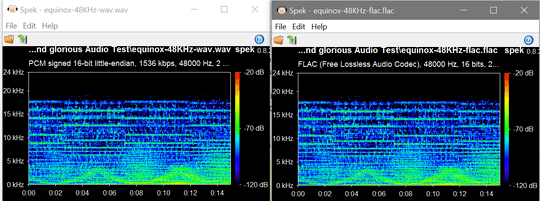First of there are two types of compression, lossless and lossy.
Lossless compression means you will get identical copy of your source when decompressed. In audio this means no quality loss during compression.
Example of lossless compression: FLAC, ALAC, Monkey Audio, Dolby TrueHD, DTS-HD MA, etc.
Lossy compression on the other hand will result quality loss. It works by discarding data to achieve better compression.
Example of lossy compression: AAC, MP3, Vorbis, Dolby Digital, DTS, etc.
WAV files containing PCM audio are not compressed audio. So no quality loss there either.
Whether or not you can tell (perceive) this quality loss depends on several factors, your ear, your audio setup (speakers, headphone, etc), encoding parameter of lossy codec, etc.


1
I see you already got downvote(not me :) ), I encourage you to read policy of this site. Such question will return a lot of opinion based answers that will mislead you and all others who will read it in a future. Regarding your question - try this
– Alex – 2017-02-12T06:26:32.190FLAC and WAV are identical in terms of quality – yoyo_fun – 2017-02-12T07:25:15.953
@yoyo_fun No. They are not. See my reply below. – None – 2017-02-12T07:25:52.920
@FleetCommand so what people refer to as WAV format when talking about ripping Audio CDs is actually the LPCM audio format contained in a WAV container ? – yoyo_fun – 2017-02-12T07:36:18.693